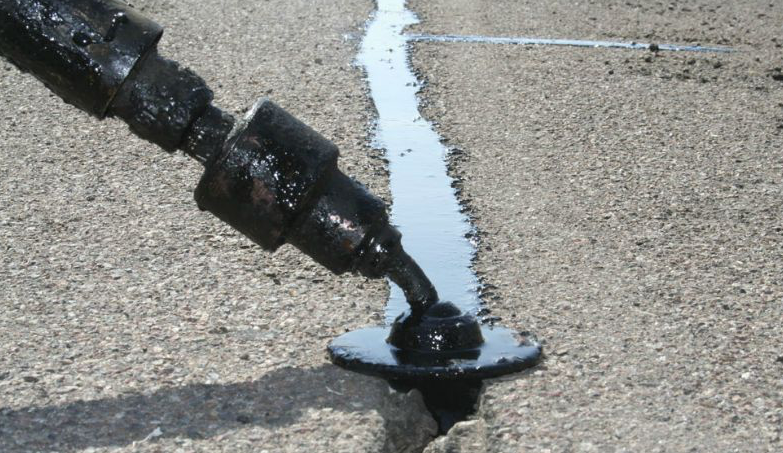Understanding Angled Parking: How Asphalt Sealing Improves Commercial Great Deals
Understanding Angled Parking: How Asphalt Sealing Improves Commercial Great Deals
Blog Article
Warm Mix Asphalt: A Sustainable Service for Pavement
Warm Mix Asphalt (HMA) has emerged as a leading sustainable choice for pavement solutions, offering a myriad of cutting-edge modern technologies and ecological advantages. Its capacity to reduce and recycle products energy consumption presents an engaging case for its adoption in road construction projects. Moreover, the lasting performance and sturdiness of HMA make it a recommended choice for infrastructure development. As the demand for environment-friendly building and construction methods expands, exploring the subtleties of HMA's sustainability can supply useful understandings right into the future of pavement solutions.
Ecological Benefits of Warm Mix Asphalt

Furthermore, Hot Mix Asphalt helps to minimize urban warmth island effects. Its dark shade soaks up sunshine, reducing the amount of warmth reflected back into the atmosphere contrasted to lighter-colored pavements. This can reduce ambient temperature levels in urban locations, reducing the need for air conditioning and eventually reducing power consumption.
In addition, Hot Mix Asphalt adds to enhanced stormwater administration. Its permeable nature permits water to penetrate the sidewalk and charge groundwater supplies, reducing runoff and the risk of flooding. These environmental advantages make Warm Mix Asphalt a sustainable choice for paving roads and highways.
Energy Effectiveness in HMA Manufacturing
Is power effectiveness an important aspect in the production of Warm Mix Asphalt (HMA)? Power plays a substantial duty in the production of HMA, impacting both price and environmental sustainability. One essential element of power effectiveness in HMA production is the usage of warm mix asphalt (WMA) innovations.
Moreover, developments in plant technologies have led to even more energy-efficient HMA manufacturing processes. By maximizing power use in HMA production, the market can lower its carbon footprint while maintaining high-quality pavement materials.
Recyclability of Hot Mix Asphalt
The recyclability of Warm Mix Asphalt (HMA) is a crucial facet of its sustainability and long-term ecological influence. HMA is one of the most recycled products in the United States, with over 100 million lots of reclaimed asphalt pavement (RAP) being reused annually in brand-new sidewalk building and construction. Recycling HMA provides a number of environmental advantages, such as reducing the need for virgin materials, reducing energy intake during production, and decreasing the amount of waste sent to garbage dumps.
The procedure of reusing HMA entails crushing the existing sidewalk, squashing it right into smaller sized items, and blending it with brand-new accumulation and asphalt binder to develop a recycled mix. This recycled mix can commonly perform as well as or even better than conventional HMA, while requiring less resources and generating reduced greenhouse gas exhausts. a fantastic read By including RAP right into brand-new sidewalk tasks, road firms can preserve natural deposits, lower prices, and decrease the ecological footprint of road building and maintenance activities. Overall, the recyclability of HMA plays a significant role in promoting sustainable practices within the sidewalk sector.

Long-Term Performance of HMA
Asphalt pavements demonstrate sturdiness and strength over an extensive duration, mirroring the lasting efficiency of Warm Mix Asphalt (HMA) The long life of HMA can be associated to its capacity to hold up against hefty website traffic tons, severe weather condition problems, and the impacts of aging. Research studies have shown that well-designed and properly created HMA pavements can last for 20 years or more with regular maintenance. The secret to maximizing the long-term performance of HMA hinges on using premium materials, following best techniques in construction, and executing efficient maintenance techniques. Proper water drainage, regular assessments, and timely repair work are essential for maintaining the architectural stability of HMA pavements over time. Furthermore, improvements in HMA technology, such as using polymer-modified binders and cozy mix asphalt, have better boosted the toughness and durability of HMA sidewalks. By prioritizing quality building and construction and maintenance techniques, HMA continues to prove itself as a lasting and cost-efficient remedy for resilient sidewalk facilities.

HMA: Sturdiness and Sustainability
Demonstrating both durability and sustainability, Warm Mix Asphalt (HMA) has come to be a foundation in the construction of long-lasting sidewalk infrastructures - commercial parking lot paving. HMA's toughness stems from its capacity to endure heavy lots, severe climate conditions, and high website traffic volumes, making it a trusted option for streets, read what he said freeways, and airport paths. The make-up of HMA, which usually consists of accumulations, binder, and filler, plays an essential function in enhancing its durability and resistance to tear and wear
Additionally, HMA's sustainability exists in its recyclability and energy-efficient production procedure. The capacity to reuse reclaimed asphalt sidewalk (RAP) in new HMA combinations decreases the need for virgin products and decreases the environmental effect of sidewalk construction and upkeep. In addition, the power efficiency of creating HMA depends on its reduced mixing temperatures compared to other sidewalk products, bring about reduced energy usage and greenhouse gas discharges.
Conclusion
In final thought, hot mix asphalt (HMA) supplies a lasting service for pavement with its ecologically friendly features. HMA's recyclability, power efficiency in manufacturing, and long-lasting longevity make it an environmentally friendly choice for roadway building.
HMA is one of the most recycled materials in the United States, with over 100 million bunches of recovered asphalt pavement (RAP) being reused each year in new pavement building.The process of reusing HMA involves milling the existing sidewalk, crushing it right into smaller items, and mixing it with brand-new regrading aggregate and asphalt binder to develop a recycled mix.Asphalt pavements show toughness and resilience over a prolonged period, showing the lasting performance of Warm Mix Asphalt (HMA) In addition, improvements in HMA technology, such as the usage of polymer-modified binders and cozy mix asphalt, have actually further improved the durability and durability of HMA sidewalks. The ability to recycle reclaimed asphalt sidewalk (RAP) in new HMA blends lowers the demand for virgin materials and decreases the ecological impact of sidewalk construction and maintenance.
Report this page